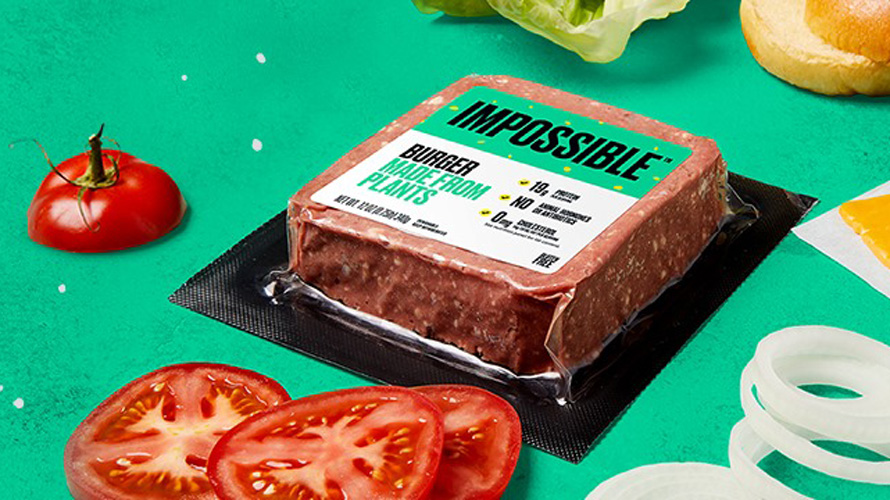As the Meat Industry Stumbles, Here’s How Plant-Based Brands Are Stepping Up Their Game
Key Insights:
Can we make some of the passive constructive more active? As Covid-19 outbreaks have shuttered meatpacking plants throughout the American Midwest, there’s a perfect storm of negative chatter around the meat industry. In addition to highlighting short-term meat shortages and higher prices, news reports are exposing the industry’s harsh conditions for workers and animals.
Such a moment could be a perfect time for plant-based protein marketers to tell the American consumer, “We told you so.”
But the biggest players in the faux meat world, namely Impossible Foods and Beyond Meat, have no plans to go for the jugular with PETA-style attacks against the meat industry. In fact, they’re taking the marketing equivalent of the high road, emphasizing their stepped-up availability via grocery stores and restaurant delivery, at a time when it might be tough to get a burger at Wendy’s.
Rather than highlighting the ominous debate around the supply lines of beef, chicken and pork, the meat-alternative brands are leaning into their charitable programs and promoting their original content, virtual events, new family-sized retail packages, direct-to-consumer channels and just-launched discounts. They’re still emphasizing their meat-like flavor, but pushing their earth-friendly and nutritional messages further to the fore amid rising consumer interest in those priorities.
The meatless marketers’ light-but-still-aggressive approach isn’t entirely magnanimous. They also don’t want to appear to be capitalizing on their competitors’ misfortune during a global pandemic.
But they do have plenty of their own gains to tout, which includes skyrocketing demand that Nielsen pegs at a 278% increase in sales of plant-based meat substitutes since this time last year.
Some recent quarantine periods have seen even more dramatic boosts for the sector, per Nielsen: in the week ending March 21, sales of meat alternatives grew 454% compared to a 100% bump in real meat sales.
As Zak Weston, foodservice expert at the nonprofit Good Food Institute, puts it, faux meat marketers don’t need to talk about animal mistreatment, Covid-19 cases among slaughterhouse workers or rising beef prices. Every major news outlet is taking the lead there, as the White House has declared the meatpacking industry an essential business and tried to send workers back to factory floors.
But plant-based protein brands as varied as Tofurky and Dr. Praeger’s can use this backdrop, with its meat shortages and retail rationing, to tell their stories to a more broadly receptive audience.
“We’re seeing the inherent fragility of the conventional animal protein chain laid bare,” Weston says. “That’s presenting unique opportunities for plant-based brands to show their advantages and the ways they can compete with the big players in animal protein.”

Impossible Foods expands into Kroger, debuts first cookbook
As a mover-shaker in the space, Impossible Foods had been riding high on its Burger King deal for the hot-selling Impossible Whopper, as well as alliances that continued to stack up over the past few years for its faux beef, pork and sausage lines with Red Robin, Little Caesars, White Castle and other chains. (This, after starting its consumer journey at tony eateries like David Chang’s Momofuku and Michael Symon’s B Spot cafes).
All those channels have suffered because of the Covid-19 lockdown, sending Impossible and other restaurant suppliers scurrying to make up the difference.
The brand had already set its sights on supermarkets (traditionally the stronghold of competitor Beyond), launching its faux ground beef last fall in specialty retailers like Gelson’s.
Now Impossible is taking its grocery presence to a new level with its just-announced partner: Kroger, which will stock the brand in 1,700 stores. Having started the year with about 150 stores, Impossible is on a distribution roll (2,700 doors and counting), expecting to “expand more than 50-fold in 2020,” says Jessica Appelgren, vp of communications for the brand. Combined with a fresh $500 million funding round and partnerships with DTC apps like Cheetah, the retail growth is expected to help make up some of the loss from closed restaurants.
https://www.adweek.com/brand-marketing/as-the-meat-industry-stumbles-heres-how-plant-based-brands-are-stepping-up-their-game/